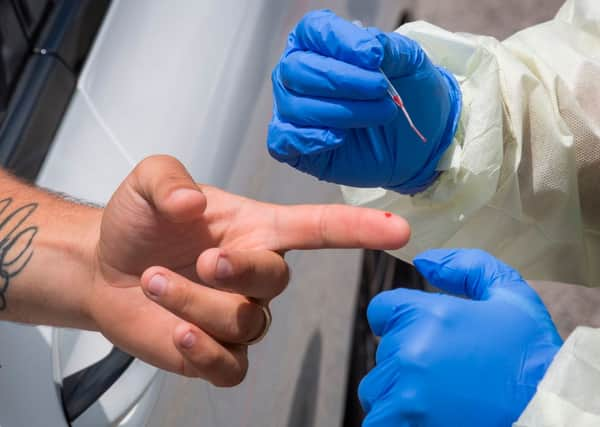How to get a Covid antibody test as new UK programme launches this week


A UK-wide antibody testing programme will be rolled out to the general public for the first time this week, the government has announced.
The programme is being launched in a bid to improve understanding of the antibody protection provided by both vaccination and previous coronavirus infection.
Advertisement
Advertisement
Here’s what you need to know about the programme and who is eligible for a test.
What is an antibody test?
An antibody test checks for evidence of antibodies in the blood post Covid-19 infection, which the body generates to help fight off the disease.
Those who have coronavirus antibodies in their blood will likely have had the virus before, even if they did not experience any notable symptoms.
It is not yet clear how long antibodies last and if they can prevent being infected with the virus again.
Who can get an antibody test?
Advertisement
Advertisement
From Tuesday (24 August), anyone over the age of 18 in England, Wales, Scotland, or Northern Ireland can opt in to the antibody testing programme when receiving a PCR Covid-19 test.
Up to 8,000 people who test positive for coronavirus will be enrolled in the programme, which is run by the UK Health Security Agency alongside NHS Test and Trace.
Those who are selected will be sent two finger prick antibody tests to complete at home and send back for analysis.
The first test must be taken as soon as possible after the positive PCR result so that the body does not have time to generate a detectable antibody response to the infecion.
Advertisement
Advertisement
Participants should then take the second test 28 days later to measure the level of antibodies that have been generated.
Can I still take part if I have been vaccinated?
People who have been vaccinated against Covid-19 can still enrol in the programme and take the antibody tests.
The UK government has said that the antibody tests will detect the body’s response to both the virus or vaccinations.
However, the tests will not be able to detect if you currently have Covid-19.
When will I get the results?
Advertisement
Advertisement
Results should be returned within three to seven days of taking the test, according to the government’s Covid-19 testing website, and will usually be delivered via email or text.
If you receive a positive result, this means that the test detected Covid-19 antibodies in your blood, indicating that you have some protection against the virus.
A negative result means that no Covid-19 antibodies were detected in your blood, indicating that you have a lower level of protection against the virus.
Antibodies are usually generated within 28 days of being infected, or after vaccination, but in some cases this may take longer.
Advertisement
Advertisement
If you receive a void result, this means that the test did not work properly. However, you should still record this result for purposes of the research programme.
The results will be used to monitor levels of antibodies in positive cases across the UK and may also aid understanding into any groups of people who do not develop an immune response.
The Department of Health and Social Care said it is the first time antibody tests have been made available to the general public since the pandemic broke out.
It is hoped that the data will help to inform the ongoing approach to handling the pandemic going forward, as well as providing insight into the effectiveness of the vaccines on new coronavirus variants.
Advertisement
Advertisement
Health Secretary Sajid Javid said the programme will build on the “massive wall of defence” offered by the UK vaccination programme.
He said: “Our new national antibody testing will be quick and easy to take part in.
“By doing so you’ll be helping strengthen our understanding of Covid-19 as we cautiously return to a more normal life.
“I’m proud to see all parts of the UK uniting around this new initiative and working together to arm ourselves with even more valuable insights into how Covid-19 vaccines are protecting people up and down the UK.”
Advertisement
Advertisement
UK Health Security Agency chief executive Dr Jenny Harries added that the testing will provide “vital data” into the impact of the vaccine rollout, as well as insight into the immune responses to different coronavirus variants.
D Harries said: “This innovative programme is only possible thanks to the thousands of people who continue to help with studies on vaccine and treatment effectiveness each week.
“The best way to protect yourself and those around you is by getting vaccinated.
“I encourage anyone who has not yet come forward to book their first and second jabs.”
This article originally appeared on our sister site, NationalWorld.